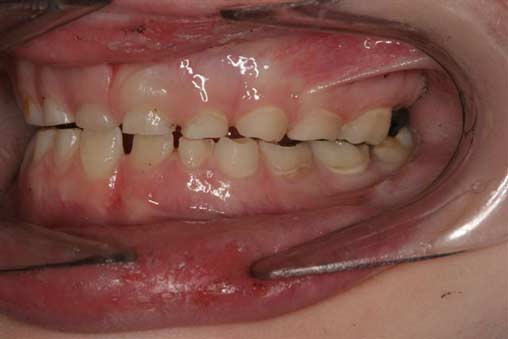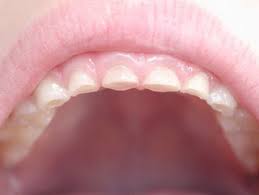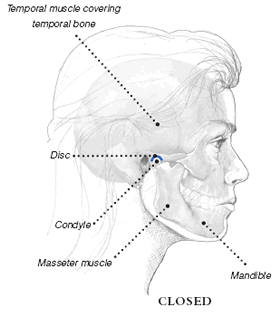What Causes Teeth Clenching During Sleep
Teeth clenching is caused by a small mouth with not enough space for all the teeth and tongue to fit properly into the mouth. A small mouth leads to crowded teeth, a bad bite and trouble breathing during sleep.
Do you wake up with your teeth clenched? Or gasping for air? Do you feel like you never get enough sleep? If so this post is all about how to stop teeth clenching, TMJ pain and sleep apnea. All of these things are linked and related to having a small mouth and nasal passageways. Millions of people suffer from tooth grinding or bruxism. Sometimes it is a minor annoyance and a nagging pain. But at other times it can be debilitating and cause migraine headaches and very poor sleep.

What Causes Night Time Clenching?
Night time clenching is usually more related to mouth breathing and airway obstruction conditions. When the mouth space is too small, the tongue falls into the throat and it blocks breathing through the airway. Teeth clenching wakes you up (into light sleep) as apart of a defense mechanism to help people get enough oxygen and be able to breathe.
Clenching During the Day
Daytime clenching is caused by poor biomechanical function of the bite. If you have a bad bite and poor jaw alignment, you are at increased risk of clenching your teeth. Most people with this condition also have bad posture and sometimes neck, back and shoulder tension. When the jaws are misaligned it causes forward head posture and a lot of upper body tension.
Treatment Options for Teeth Clenching Video by Dr. Adams
Contact us Today for a no cost Consultation
How to Cure Teeth Clenching
The key to curing teeth clenching and TMJ pain is addressing to root cause of the problem. Dr. Adams has adult expanders that can create space in the jaws. Two such appliances are the Vivos DNA and the Homeoblock appliances. If used correctly, these appliances can improve the bite, airway, breathing and sleep. Needless to say, the value of palatal expanders in correcting TMJ pain, mouth breathing and sleep cannot be overstated.
Day Time Vs Night Time Clenching?
There are two types of clenching: day clenching and clenching during sleep. Most people clench their teeth at night during deep sleep. Day clenching is usually caused by a bite problem where teeth hit harder on one side of the jaw. Or in-other-words, when the jaw closes properly teeth hit on one side of the mouth before the other. People will usually close their jaw and try to steer around the area where the bite is off. The “steering around” is usually realized as popping and clicking of the TMJ and deviation of the jaw when opening. This problem creates an uncomfortable condition where the jaw muscles do not have a place to be stable and rest properly when the mouth closes. Sometimes people who have recently had a lot of dental work done or who have had a lot of orthodontics done have this problem with the bite. Most people who clench during the day also clench their teeth at night which is the bigger problem.
What Causes Teeth Clenching During Sleep?
People who clench and grind their teeth at night time have small mouths and upper airway spaces. When the mouth is small, there often is not enough room for the tongue to fit and function properly. When people get into deep sleep all the muscles in the body relax including the tongue (a very large muscle). If the tongue does not fit, it gets displaced into the throat where it partially blocks the airway. At this point oxygen levels start decreasing and the teeth clenching reflex is activated. Teeth clenching wakes people up into a lighter sleep where the tongue comes out of the throat and back into the mouth. This is the body’s defense mechanism to maintain proper breathing during sleep. The phenomena is part of upper airway resistance syndrome (UARS).
Treatments for Bruxism or Tooth Clenching?
- protective – teeth grinding guards, protects teeth against getting worn down and lots of dental work
- management – an appliance that manages and reduces clenching
- corrective – an appliance that creates more space, balances the bite and corrects the underlying causes of clenching. For example curing airway and bite problems.
Protective Appliances
Night guard or occlusal guard. People will still clench, but they will just clench the plastic. Most people will not tolerate this treatment because the clenching usually gets worse because there is more clenching on the plastic guard. It really is not comfortable as there is more muscle tension. The appliance also takes up space in the mouth and further crowds the airway.
Management Appliances
Bite splint for splint therapy. Splint therapy is the use of a plastic appliance to put the patient into a more open and forward bite. A splint puts the jaws into a more restful position and is a great way to relax the jaw when sleeping. If a bite splint is made properly, it will typically reduce clenching by 30-70%. Occlusal splints do not correct the problem, but they can relieve a lot of symptoms if worn during the night. Splints work much better than night guards because they relieve muscle tension and decrease clenching. People usually clench more on night guards. Splint therapy used to be the only treatment for TMJ till corrective appliances became available a few years ago. Splints must be worn during sleep forever to keep you comfortable. Splints will also need to be adjusted from time to time. Splints will also need to be replaced every 3-5 years as they wear out and begin to discolor and smell badly.
Appliances That Can Cure Teeth Clenching
Appliances that correct the cause of clenching work by creating more space in the mouth so the tongue and teeth fit better. Effective treatments are available for adults and kids. Treatments uses special expanders that stimulate a small amount of growth in the mouth and jaw structure. The new space in the mouth allows:
- optimization of the bite relationship and biomechanics of the jaw structure
- improved tongue function
- more space for airflow and breathing
One such appliance for adults is the Vivos DNA Appliance. The appliance therapy corrects upper airway restrictions and creates more space for the tongue and teeth to function optimally in the mouth. Corrective treatment will stop teeth grinding during sleep permanently by getting rid of the reason why people clench their teeth. Corrective treatment is the best permanent jaw clenching remedy. Other adult growth appliances exist for TMJ pain including the AGGA and the ALF. But Dr. Adams favorite appliance for adults is the Vivos appliance.
Anterior Growth and Expansion With Dental Appliances Video
Symptoms of Teeth Clenching
- jaw muscle pain
- neck and back pain
- popping in the jaw joint
- headaches
- sinus pressure
- ear pressure and the feeling of fluid in the ear
- tight shoulder and neck muscles and many others
Conditions that Increase Teeth Clenching:
- Stress
- Change in schedule
- Irregular schedule
- Bad weather and changes in pressure outside
- Poor work conditions such as sitting at a desk all day, or working bent over
- Change in health status
Is it Normal for Kids to Grind Teeth at Night?
Absolutely not. Teeth clenching in children is a sign of pediatric sleep apnea and upper airway problems. This condition requires treatment. And not just braces. Other symptoms include poor nasal breathing, attention deficit, bed wetting and delayed development, tied tongue. Most kids problems can be corrected with growth stimulating appliances called expanders. The most popular expanders used by Dr. Adams are Schwarz appliance and ALF appliances. See our page about holistic orthodontics. The goal is to stimulate the proper growth and development in the mouth, nasal passageways for proper night time breathing and bite balance. Failure to treat this condition leads to adult sleep apnea, poor overall development, orthodontic problems and TMJ pain. Never pull teeth for braces and to get straight teeth.
How are Teeth Grinding and Clenching Different?
For starters, most people do not grind their teeth, but rather they clench. Clenching vs grinding. There is a difference. When grinding, there is a side to side or back and forth teeth rubbing action. Grinding makes a lot of noise typically and 90% people do not grind. Most people clench their teeth. Clenching is an action where the teeth are placed together and the jaw muscles tighten teeth down on one another top to bottom. Usually tooth clenching happens at night time. In fact 80% of people who clench their teeth, do so at night time and do not even know it.

Is Teeth Clenching a Sign of Sleep Apnea?
Yes. 77% of people who have been diagnosed with sleep apnea report tooth clenching in sleep and temporomandibular joint dysfuntion symptoms. Many TMJ specialists believe that teeth clenching is just a symptom of UARS and sleep apnea. Dentists who specialize in teeth clenching and use corrective treatment are in a position to help with not only symptoms from clenching but also solving UARS and sleep apnea. Sleep apnea is linked to TMJ problems.
How to prevent Bruxism and Clenching?
Why do people end up with small jaws and a tight upper airway? It is a combination of improper tongue function due to tongue tie, genetics and a soft diet. The biggest cause of the problem is a limitation of tongue range of motion caused by the tongue tie restriction how far the tongue can move. The tie also can deform the tongue causing it to taper or curl downward on extension. In these cases, the tongue may not be able to reach the palate. The key to prevention in growing kids is diagnosing and treating tongue tie, introducing tongue exercises and dental arch expanders.

 (301) 421 1996
(301) 421 1996 burtonsvillesmiles@gmail.com
burtonsvillesmiles@gmail.com


